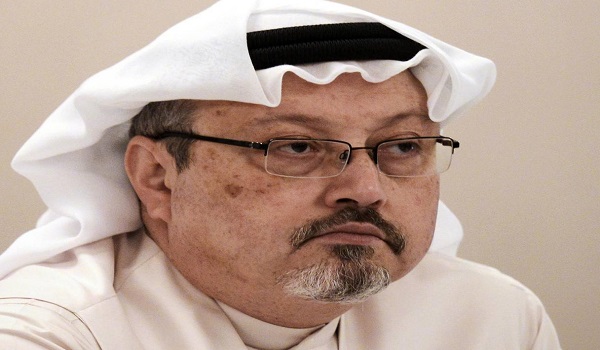It is not the first time UK trade policy has been criticised for putting deals ahead of human rights
The British government pursued arms deals with Saudi Arabia in the weeks after the killing of journalist Jamal Khashoggi, even as it publicly condemned the murder, according to the UK “The Independent” newspaper.
Khashoggi was killed by Saudi officials inside the country’s consulate in Istanbul on 2 October, prompting global condemnation and calls for a re-evaluation of ties with the Kingdom.
As the UK government called for answers over the journalist’s death, British trade officials responsible for arms sales continued to hold high-level meetings with their Saudi counterparts.
A delegation from the Defence and Security Organisation – an office within the Department for International Trade that promotes arms exports for UK companies – travelled to Riyadh on 14 and 22 October, according to a Freedom of Information request obtained by the Mirror newspaper.
The latter of those meetings came on the same day as the foreign secretary, Jeremy Hunt, condemned Khashoggi’s killing “in the strongest possible terms” in a speech to parliament.
“Whilst we will be thoughtful and considered in our response, I have also been clear that if the appalling stories we are reading turn out to be true, they are fundamentally incompatible with our values and we will act accordingly,” Mr Hunt said on 22 October.
The foreign secretary made a point of announcing the cancellation of a planned visit to Riyadh by the trade secretary, Liam Fox. However, he did not disclose that meetings over arms sales were still taking place.
Even before the murder of Khashoggi, the UK government had been under pressure to halt arms exports to Saudi Arabia over alleged war crimes and rising civilian casualties in Yemen.
Since the war began, the UK has licensed £4.7bn worth of weapons to Saudi forces, making it by far the largest buyer of UK arms. Khashoggi’s killing brought new pressure on the British government to reassess its ties to Saudi Arabia, after Germany and Norway halted all future arms sales to Riyadh.
“Jeremy Hunt was quick to join the condemnations of the killing, but he has done nothing to stop the arms sales. How many more atrocities and abuses would it take for him to act?” said Andrew Smith of Campaign Against Arms Trade.
“The regime has used these weapons to devastating effect in Yemen, where the Saudi-led coalition have inflicted the worst humanitarian crisis in the world. The murder of Jamal Khashoggi was yet another appalling crime by the Saudi authorities.”
Even as more evidence has emerged pointing to the culpability of the Saudi government in Khashoggi’s killing, the UK appears to have made no substantial change to its relationship.
Prime minister Theresa May held face-to-face talks last month with Mohammed Bin Salman, Saudi Arabia’s de-facto leader whose close aides carried out the killing and subsequently attempted to cover it up.
Ms May said she stressed “the importance of a full, transparent and credible investigation into the terrible murder” during her meeting with the crown prince at the G20 summit in Argentina. But Labour leader Jeremy Corbyn accused her of not following through with action.
“Rather than be robust, as she promised, we learned the prime minister told the dictator ‘please don’t use the weapons we are selling you in the war you’re waging’ and asked him nicely to investigate the murder he allegedly ordered,” Mr Corbyn said last month.
“Leaders should not just offer warm words against human rights atrocities but back up their words with action,” he added.
Mr Hunt has defended arms sales to Saudi Arabia, citing Britain’s “important strategic partnership” with the country “which has saved lives on the streets of Britain”.
H.M

